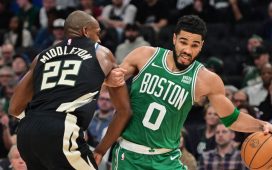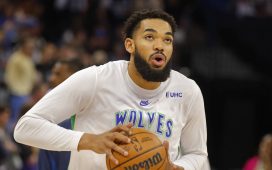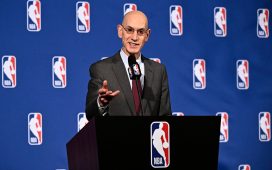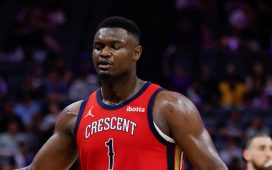EUGENE, Ore. — Sabrina Ionescu woke not long after dawn in her small apartment, laced up her black Nikes and walked across a deserted street to the looming arena where she had spent the last four years creating memories.
She needed to find something she could control.
It was March 21, a crisp Saturday. Ionescu and her No. 2-ranked Oregon Ducks had been expecting to host March Madness games that weekend. If not for the coronavirus pandemic and the sudden cancellation of the N.C.A.A. tournament, she would have been playing in front of a buzzing home crowd at Matthew Knight Arena. Instead, the most vaunted player in college basketball used a key to let herself inside the empty complex and began working out alone.
With no one else inside the 12,000-seat arena, the echo of dribbles, of balls slicing through net or banging against the rim, was a symphony of her own making.
Her first shots were from midrange. Dozens of them. Then one-dribble pull-ups. Then from distance.
It felt like therapy, she would recall, describing her morning in a telephone interview.
Close-to-the-basket floaters, right-handed layups, left-handed spinners, and the turnaround step-back jump shot her mentor, Kobe Bryant, had schooled her on last summer.
Her shooting stopped only after she was sure she had orchestrated just the right balance of confidence and sweat-soaked exhaustion. Then she sat down, unfolding her 5-foot-11 frame on the hardwood and letting her mind drift toward thoughts of the future and the past.
Thousands of college athletes saw their seasons collapse on March 12, when the N.C.A.A. shuttered all sports. But no athlete was more poised for an anticipated championship run than Ionescu, the career collegiate leader among both men and women for a prime measure of dominance: triple-doubles, tallying at least 10 each in three major statistical categories in a game.
Her journey this season, filled with record-breaking achievement and stark tragedy, drew fans to her on television and the internet, at home and on the road. Her high-octane team played before sellout crowds that rippled with fans in green and gold replica jerseys with her No. 20, which Ionescu had to lobby Nike to make last year. They sold out in two hours.
She is projected to be the top draft pick this April in the W.N.B.A., where she will presumably get to test her skill and marketing might on the professional level. But first she must contend with having had the biggest stage of her career ripped away, in a season that ended far from how she had dreamed.
Since her childhood, the grinding routine of heading to a court for lonely work had provided Ionescu a calm sense of solace. Basketball courts became hallowed grounds. Especially this one. Especially now.
The first game of this season, the Ducks were ranked No. 1 and played the United States national team, stocked with top professionals, in an exhibition in Eugene. The Ducks trailed by 11 in the second half, but the game’s turning point came in the last quarter, when Ionescu rose from just past midcourt and buried a tide-changing 3-point shot.
“Steph Curry’s in the house!” shouted a television announcer, comparing her to the famed Golden State Warriors guard. “Curry would have loved that shot!”
The Ducks became the first collegians to beat the national team since 1999, and the 93-86 win highlighted what makes Ionescu magnetic and unstoppable. Offense, defense, a comfort with angles and an awareness of every player and possibility. A sense of when to take over.
“She’s able to conjure up whatever she needs in any particular possession to help her team,” said Connecticut Coach Geno Auriemma, whose No. 4-ranked Huskies hosted Oregon at midseason and lost by 18 points. “A defensive play, a rebound, an assist, a big 3.”
Then there is her obsessive drive. It has fueled her since she first fell in love with the game, jostling against her twin brother, Eddy, on a hardtop public court near the San Francisco-area home where she grew up. Teammates and rivals speak of it in awe. “Relentless might not even do it justice,” said Kelly Sopak, who was Ionescu’s coach from elementary age through high school, guiding her through hundreds of games and practices. Not once did he see her go anything but all out.
Such bone-deep intensity drew attention to Ionescu from the N.B.A. elite, too, including LeBron James, who called her “Queen Sabrina” on Twitter. But her focus connected her most closely to Bryant.
The two bonded during Ionescu’s junior season, after the retired Lakers star brought Gianna, a budding basketball star and the second-born of his four daughters, to an Oregon game in Los Angeles and left impressed. “Geppetto,” he called her in a segment breaking down her game for ESPN, “the puppet master.”
Ionescu spent a weekend coaching Gianna and her team alongside Bryant, and he became a trusted guide. They spoke on the phone and texted back and forth. As the season went on and she added more games to her N.C.A.A. record for triple-doubles, Bryant gave her a simple, game-recognizes-game recognition: “I see you!”
Like Bryant, Ionescu had struggled to relate to teammates. . Nobody worked as hard. Nobody seemed to take losses in the same soul-crushing way. Oregon Coach Kelly Graves said that during Ionescu’s freshman and sophomore seasons, there were times when she would be sharp with teammates and they would shut down.
“It was brutal,” Ionescu said. She had changed the fortunes of a middling team that had not been to the N.C.A.A. tournament since 2005. The Ducks went to the Elite Eight in her first two seasons. But Ionescu said there were times when she felt isolated from her teammates. “How competitive I am, there was nobody that compared to that,” she said. “There was just kind of this separation between me and the team.”
That began changing when she focused on reaching out to each player around her, seeking understanding and common ground. “She had to figure out the nuances of how to connect,” Graves said.
In her junior year, during the last seconds of a home loss to U.C.L.A., a teammate failed to help get an easy rebound. Ionescu fouled out and then stalked to the sidelines, steaming. Someone handed her a water bottle. She slammed it to the court. As the clock wound down, Ionescu stood apart from the action.
She came to realize that she needed to make amends. During a tense meeting not long after the game, she opened up to her teammates about how much she cared for each of them, about the pressure she faced, about the difficulty that came with ever-increasing attention and expectations.
On paper napkins, some of them stained with tears, each player wrote a promise to the others. Ionescu penned a single word: assurance.
She vowed to never let them down again.
“That set the tone for what our team became last season,” she said, a nod to the Ducks’ 2019 run to the Final Four, which ended in a close semifinal loss to Baylor, the eventual champion. “I told Kobe about that meeting over the summer, and you know him, he said ‘What, you had to apologize?’ He was like, ‘Oh, that’s soft.’ But then he thought about it and he said, ‘You know what, that was probably the right thing to do. You need to know that that is not how a leader should be.’”
She said this during an interview in early March, weeks before the pandemic sent most students back to the cocoon of parents and home. At Matt Knight, as she called the Ducks’ arena, Ionescu sat in the stands, relaxed and dressed in a sweatsuit. She occasionally cracked a wry smile as she spotted a coach down on the court, working on his shot, and missing.
Then she grew somber.
She remembered learning of unshakable tragedy. Kobe. Gianna. Seven more. All killed when the helicopter they were using to get to a youth basketball game slammed into a Los Angeles-area hillside.
It was Jan. 26. Ionescu and the Ducks had traveled an hour north for a game in Corvallis against their rival Oregon State. She recalled being in the locker room and hearing a teammate blurt out that Kobe had died. At first, she thought her teammate was talking about someone’s pet. Then her phone burst with texts from friends saying how sorry they were for her loss.
“I lost it. When it hit me, I blacked out,” she said.
Soon she was surrounded by parents, coaches and teammates as she sobbed. They hugged her, held her hand, whispered comfort.
The game went on. Ionescu’s teammates walked soberly to the Gill Coliseum court without her. Then, minutes before tipoff, she showed up.
Assurance.
The court was where she needed to be.
“I don’t recall the actual game,” she said. “Normally I remember every play. I don’t even really have to watch game films. But that one, nothing.”
Oregon won, 66-57. Ionescu scored a team-high 19 points and played all 40 minutes.
Four weeks later, she was at Staples Center in Los Angeles for the memorial tribute to Bryant and Gianna. Vanessa Bryant, Kobe’s wife, asked Ionescu to speak.
The arena was packed with Bryant’s grieving family, tearful Hollywood stars, basketball Hall of Famers and mourning fans. Ionescu, the only college athlete to take the stage, shook with nervousness as she stood before them. Then she focused the same way she does at the beginning of every game. It felt like being “in the zone.”
Her mentor, she told the crowd, was “a sun beaming, radiating, fixed in the sky.”
“I still text him, even though he’s not here. Thank you for everything. Rest easy, my guy.”
Ionescu flew to San Francisco hours later. Her father, Dan, a limousine driver, picked her up and whisked her to the Stanford campus, where the Ducks played the No. 4 Cardinal.
Just as at Oregon State, she couldn’t go through a full warm-up. The emotions of the day were finally hitting. Instead of being with her teammates, she was vomiting in the locker room. Once again, she barely made it to the court before tipoff.
Again Ionescu would recall little, even though this time she made more history. When she gathered an errant shot in the third quarter, Ionescu became the only player in college history, male or female, with 2,000 career points, 1,000 assists and 1,000 rebounds.
The date matched the jersey numbers worn by Gianna Bryant, Kobe Bryant and Ionescu: 2-24-20.
“Two for Gianna,” she said. “Twenty-four, Kobe.” Twenty, of course, was her own.
“Fitting. Getting the record on that day. You just kind of have to laugh. Because that is probably something he would do.”
Since the helicopter crash, Ionescu admitted she had been struggling. “My head feels like it’s in a cloud,” she said. “I am still not myself.”
She played in 12 games in the six weeks afterward, West Coast to East. She did not have much appetite. She lost weight, and her stomach still churned. Smiles and laughter were not easy.
And yet the tragedy also brought unexpected perspective, even a sense of peace. Ionescu’s goal for her senior season had been to win it all — to resolve unfinished business, as she called it. That changed after the crash. She was still driven and obsessive, but she realized that winning isn’t everything. “I learned to embrace the journey more, the moments more,” she said. “The hard journey. All of it. Nothing is promised. There aren’t any guarantees.”
She leaned on that wisdom after the N.C.A.A. tournament was canceled. The day she heard the news she was in Los Angeles, sitting inside a conference room in a glass-clad high rise, listening to sports agents who hoped to guide her career once she turned pro. She would be a huge catch. She just might become the icon her game needs. Then came a text from Coach Graves.
NCAA tourney has been canceled, it read.
Call me.
Ionescu hauled herself back to Eugene and holed up in her apartment with her twin, who plays for the Oregon men’s team.
Everything was uncertain in this new life, far from the career transition she had just been planning. No stirring run to the national title. Tons of time. Alarm clock off. She ordered takeout Mexican food and used her mother’s recipe to cook stuffed bell peppers. She caught up with “The Bachelor” and read one of the books from Bryant’s “The Wizenard Series,” about a struggling youth basketball team transformed by a magical coach.
Eugene felt barren, she saidin a telephone interview. When she went with her brother to Costco, instead of turning heads and finding herself surrounded by a clutch of fans, she saw people keeping their distance.
To steady her mind, Ionescu focused on routine. She ran sprints on an open field. She returned again and again to her arena, to sweat and to send rainbow jump shots flying and to think.
It was what she could control.
Was she scared?
No. Not really.
Then a moment passed and she hedged, acknowledging the hard truth of the moment.
“It’s more like the fear of the unknown. Not really knowing what is going to happen next,” she said. “For me, it’s when the W.N.B.A. might start. What about the draft? What does the future have in store? Is there going to be a season, are they going to push it back? I don’t have answers to any of that. I don’t have any answers at all.”





